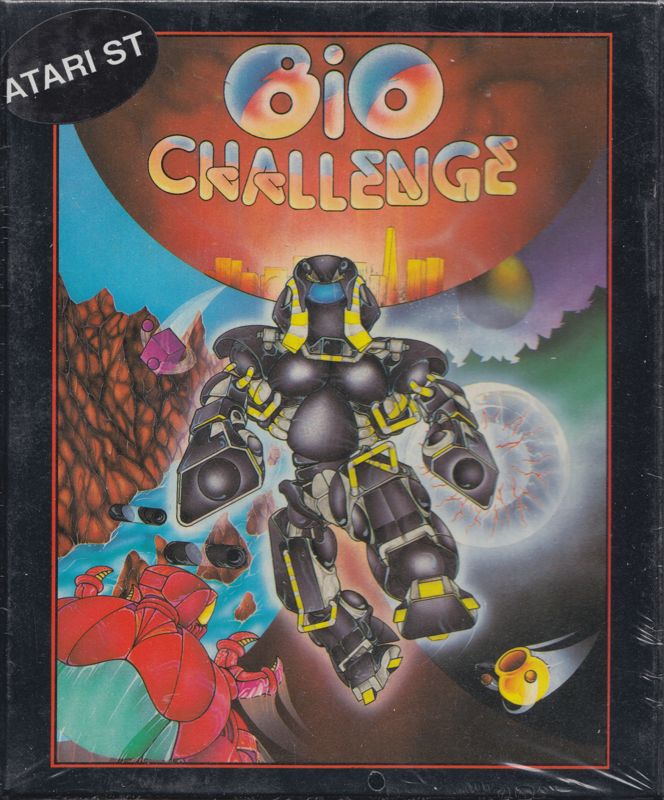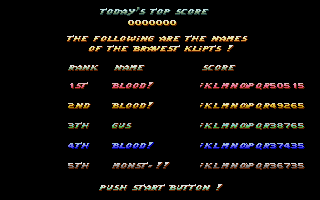Retro Replay Review
Gameplay
Bio Challenge unfolds as a slightly difficult 2D platformer that puts precision and timing at the forefront. You guide K.L.I.P.T., a purpose-built cyborg, through increasingly complex stages filled with deadly hazards, retractable blades, electrified floors, and environmental puzzles. Each level challenges your reflexes and punishes hesitation, making every successful leap or narrowly avoided trap feel immensely satisfying.
(HEY YOU!! We hope you enjoy! We try not to run ads. So basically, this is a very expensive hobby running this site. Please consider joining us for updates, forums, and more. Network w/ us to make some cash or friends while retro gaming, and you can win some free retro games for posting. Okay, carry on 👍)
The controls are responsive and intuitive, allowing you to run, jump, and dash with minimal input lag. K.L.I.P.T.’s movement feels weighty yet agile—he lands with a metallic thud that reminds you of his mechanical nature but pivots quickly to dash or climb, giving players a strong sense of agency. The learning curve ramps up steadily, introducing new obstacles in measured doses so that by the halfway point you’re confidently chain-jumping across moving platforms and outpacing timed missiles.
To keep things fresh, levels incorporate themed challenges—acid pools requiring careful timing, magnetic fields that invert your gravity, and laser grids demanding split-second decision-making. Hidden alcoves tucked away in each stage invite exploration and reward persistence, whether through extra lives, energy refills, or lore scraps hinting at the world’s backstory. Boss encounters bookend every chapter, turning typical platform sections into high-stakes duels of pattern recognition.
Overall, Bio Challenge strikes a fine balance between trial-and-error platforming and thoughtful level design. It never feels unfair; rather, its difficulty encourages you to learn from mistakes, adapt your strategy, and relish each hard-earned victory. For players seeking a 2D experience that respects their time and skill, the gameplay loop here is both engaging and addictive.
Graphics
Visually, Bio Challenge shines with crisp, hand-crafted pixel art that evokes the golden era of Amiga and early console titles. The game’s color palette leans toward muted metallics and industrial grays, punctuated by electric blues and corrosive greens to highlight dangers or interactive elements. Backgrounds feature distant city skylines, flickering neon signs, and the occasional flicker of a dying power grid, reinforcing the dystopian atmosphere.
Character and enemy animations are fluid and detailed. K.L.I.P.T.’s servomotors whirr audibly, his joints articulate naturally, and his laser-guided eyes glow ominously when threats appear. Enemies range from rogue maintenance bots to genetically mutated creatures, each animated with distinctive movement patterns that telegraph their attacks. This clarity in design helps the player plan their next move when the screen becomes crowded with hazards.
Subtle visual flourishes—such as sparks flying off damaged platforms, dynamic lighting when lasers sweep across a corridor, and environmental parallax scrolling—add depth and polish. While some levels share similar layouts, small seasonal variations (like drifting smog or dripping condensate) prevent the world from feeling static. The 2D aesthetic remains cohesive throughout, striking a balance between retro charm and modern detail.
Story
Bio Challenge sets its narrative in a near future where humanity’s gene code has grown progressively weaker, imperiling the species with each passing generation. The world’s leading scientists respond by constructing K.L.I.P.T., a cutting-edge cyborg designed to endure the harshest environments and discover new ways to bolster the human genome. Your sole mission? To survive the bio challenge and prove that this mechanical savior can carry the torch for mankind.
The story is delivered sparingly, mainly through brief opening monologues and physics-lab dossiers unlocked as you progress. This minimalist approach places emphasis on environmental storytelling: flickering consoles display fragmented data logs, shambling test subjects hint at previous failures, and abandoned facilities serve as grim reminders of the stakes. Players who explore hidden corners can piece together the greater lore and appreciate the game’s somber tone.
Though narrative beats are brief, they’re effective. The tension mounts as you advance deeper into the testing grounds—each new experiment more hazardous than the last—painting a clear picture of the desperation driving humanity’s last-ditch efforts. By the final levels, every platform hop feels like another step toward either salvation or oblivion, lending the action a palpable sense of urgency.
Overall Experience
For fans of retro-inspired 2D platformers, Bio Challenge delivers a robust package. The blend of tight controls, inventive level design, and polished presentation makes for a satisfying test of skill. It’s the sort of game you return to repeatedly, attempting speed runs, seeking out hidden areas, and mastering specific tricky sequences.
The soundtrack by Jean Baudlot (Amiga version) elevates the experience to another level. His compositions mix driving percussion with eerie synth melodies that underscore the game’s industrial, high-stakes atmosphere. Music dynamically shifts to an adrenaline-pumping track during boss fights, then returns to brooding chords when you explore deserted corridors, creating an immersive audio landscape.
Though challenging, Bio Challenge feels fair—death is always a lesson, never a punishment. Save points are thoughtfully placed, and learning patterns quickly becomes second nature. Whether you’re aiming to finish the campaign or track down every hidden collectible, there’s ample replay value. For those craving a well-crafted, old-school platformer with a dystopian twist, this bio experiment is one you won’t want to miss.
In sum, Bio Challenge stands out as a testament to careful game design and passionate craftsmanship. Its tight gameplay, appealing visuals, and atmospheric audio make it an engaging contemporary homage to classic 2D platformers—an essential pick for anyone looking to embrace a tough but rewarding journey in a world on the brink.
 Retro Replay Retro Replay gaming reviews, news, emulation, geek stuff and more!
Retro Replay Retro Replay gaming reviews, news, emulation, geek stuff and more!









Reviews
There are no reviews yet.